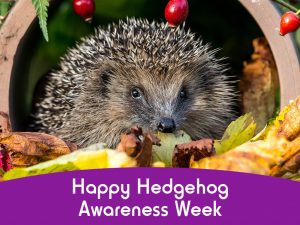24, May, 2021

Hedgehog Awareness Week occurs during the first week of May each year. The British Hedgehog Preservation Society (BHPS) helps raise awareness through campaigns, advocacy and educational projects so that practical steps can be taken to reverse the decline of hedgehogs in the wild. The BHPS also funds research to gain further insights into these much-loved creatures. Through Hedgehog Awareness Week, the BHPS aim to draw attention to the work they do and encourage the British public to get involved. But what can you do to help this endangered species? Read on to find out more…
How can I help hedgehogs?
There are a number of things you can do to help hedgehogs thrive in your local area, starting in your garden:
- Make sure that any piles of leaves or logs are left undisturbed. They can make an effective hedgehog nest and will also double up as a great habitat to attract a rich feast of earwigs, centipedes and woodlice.
- Cover any drains or deep holes that hedgehogs could fall into. If you have a pond or swimming pool, make sure there is an easy way out. Although hedgehogs can swim, they sometimes need a helping hand. Try placing half submerged rocks near the water’s edge, to help them should they get stuck.
- When spring arrives and gardening begins, be sure to check grassy areas before using a lawn mower or strimmer. This will prevent any potential accidents with hedgehogs.
- Avoid using pesticides or poisons that hedgehogs may accidently ingest, whether that be directly or when eating food sources such as beetles, worms and caterpillars.
- Although you might find it hard if your garden is your pride and joy, try to leave the gardening as long as possible to allow wildlife to thrive in a more natural habitat.
- Tidy up any litter that may have been left or blown into your garden to avoid any hedgehogs getting trapped.
What should you do if you find a hedgehog in your garden?
There are a few things to consider if you spot a hedgehog before deciding if any action is needed. If the hedgehog is out at dusk or late evening, this is perfectly normal behaviour and the hedgehog can be left well alone. Leave out a shallow dish of fresh water and some scrummy Spike’s Hedgehog Food to help them with the energy they need to raise their new hoglets or to build up their fat stores ready for hibernation.
If you spot a hedgehog out in winter or in the middle of the day, then it could be that the hedgehog is unwell. In the winter months, hedgehogs traditionally hibernate due to the lack of food available in colder temperatures. However, this is no longer always the case with many hedgehogs coming out of hibernation in winter in search of food. Some hedgehogs, in southerly parts of the country, might not hibernate at all, so seeing a hedgehog out in the winter is not always a reflection of them being unwell. It can be hard to tell if there is something wrong so if in doubt, seek advice from your local hedgehog rescue.
When should I help a hedgehog?
If you spot a hedgehog in your garden in the winter months or in the middle of the day, check to see if their eyes are open. If they are open then the hedgehog is not in immediate danger but you can continue to monitor from a distance, just to be on the safe side.
If you find one on a road, laying with their eyes closed, or if they look like they might weigh less than 300 grams, they likely need some help.
Other signs that a hedgehog might be in distress and need your help are:
- Appears to be lethargic – hedgehogs don’t sunbathe. They prefer dark, damp areas so if you happen to see one out in the sun and they’re not moving, it is likely there is something wrong.
- Flies – if a hedgehog has a swarm of flies surrounding them, they urgently need some help.
- Wobbly – while out and about, if you spot a hedgehog that seems wobbly when they walk, then the hedgehog is unwell and needs help from a hedgehog rescue.
- Obviously injured – no matter what the injury is, make sure you speak with a hedgehog expert who can offer support with next steps.
- Trapped – have they been caught in netting, a pond or in a drain? If so, the hedgehog is going to need a helping hand.
- Hoglets – if you see hoglets out in the day, without an adult and/or they are squawking, they will need intervention from a hedgehog rescue or the RSPCA.
If you spot a hedgehog that fits one of the above criteria, contact the RSPCA or your local hedgehog rescue, who will be able to offer further assistance. For more help or advice about spotting the signs of a hedgehog in distress, take a look at The British Hedgehog Preservation Society website for more information.
Do you have regular hedgehog visitors in your back garden? Why not add your sightings to our hedgehog map and take part in the Spike’s Great British Hedgehog Survey.

